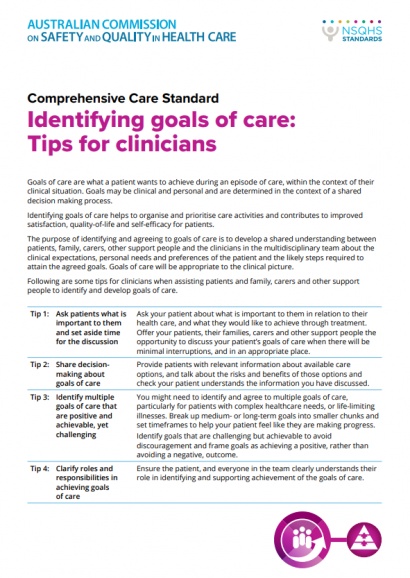The Antimicrobial Stewardship Clinical Care Standard contains eight quality statements that describe the care that patients should received when they have an infection, or are at risk of an infection. Learn what the standard means for consumers and the other Antimicrobial Stewardship Clinical Care Standard resources available.
Ensuring informed consent is properly obtained is a legal, ethical and professional requirement on the part of all treating health professionals and supports person-centred care.
The Third Australian Atlas of Healthcare Variation investigates healthcare use in four clinical areas. Antibiotics dispensing in children are included in Chapter 1, Neonatal and paediatric health.
Quality statement 4 - Acute Coronary Syndromes Clinical Care Standard
A patient with a non-ST-segment-elevation acute coronary syndrome (NSTEACS) is managed based on a documented, evidence-based assessment of their risk of an adverse event.
The Emergency Department Clinicians' guide to My Health Record in EDs and its supporting resources have been developed to support hospital and ED clinicians to use the My Health Record to inform their clinical decision making.
The My Health Record system collects documents from a range of healthcare providers. Some of this information may not be the most up-to-date patient data at the time of access.
The Charter describes rights that consumers, or someone they care for, can expect when receiving health care. These rights apply to all people in all places where health care is provided in Australia. This includes public and private hospitals, day procedure services, general practice and other community health services.
Partnering with consumers is a key priority of the Commission. It is about actively working with people who use the healthcare system to ensure that care is safe, high-quality and meets people’s needs. It is embedded in health service organisations through the Partnering with Consumers Standard.
Communicating for safety involves the accurate and careful exchange of information about a person's care between treating clinicians, members of a multidisciplinary team, and between clinicians and patients, families and carers.
Effective clinical communication is two-way (or multi-way if between teams), structured and continuous communication that results in timely, accurate and appropriate transfer of information.
For communication to be effective it needs to be tailored, open, honest, and respectful, with opportunities for clarification and feedback.
The Commission has developed an online education module on shared decision-making that focuses on communicating risk.
Person-centred care is widely recognised as a foundation to safe, high-quality health care. It is care that respects and responds to the preferences, needs and values of patients and consumers.
These FAQs answer some common questions about the Comprehensive Care Standard, and more generally what comprehensive care means in the Australian health system.

